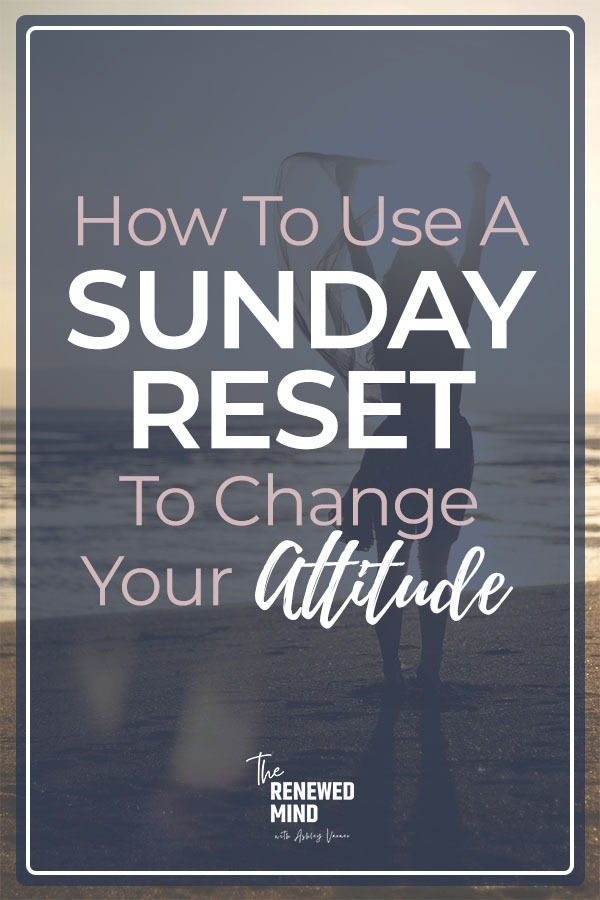Is your week out of control? Today we are talking about how a habit of weekly reflection can change your mindset and propel you towards your goals.
While a lot of other Sunday resets floating around on the internet have to do with meal planning and tidying up your home, this Sunday reset is all about resetting your mindset and changing your thinking so you can tackle your goals for the week ahead.
Keep reading, listen to the podcast, or watch my YouTube video to find out how a Sunday mindset reset can drastically change your week.
Resources Mentioned:
Renew180 (formerly 180Confidence)
The Organized Money on YouTube
Soul Time App
Power of Questions Episode
Link to Free Download
Highlights from the Episode:
Who am I?
Before we get started today, I want to share a little bit about what I do. I am a confidence coach for Christian women.
Are you successful in many areas of life yet still struggle with your confidence? Do you feel like an imposter? I am the person who can help you! I teach women how they can have confidence without their circumstances changing. Because these women gain confidence, their actions and their outcomes change, too.
Click here to learn more about working with me.
Living with Intention
My Sunday reset is inspired by Proverbs 4:25 which says, “Give careful thought to the paths for your feet and be steadfast in all your ways.”
What I noticed in this verse was the emphasis on careful thought for planning our paths. In order to be intentional with planning, I created these three steps for creating a weekly reflection:
Step 1: Decide where you want to be. Remember that it doesn’t have to match what everyone else wants.
Some people want to be on a ranch training horses. Someone else might want to be on the top of a corporate ladder while another wants to quit her job altogether and stay home with her kids.
Decide where you want to be, and don’t compare yourself to other people. Don’t let someone else tell you what you should want.
Step 2: Revisit your goals. I love setting goals. I am definitely a New Year’s resolution girl. In fact, my goals for 2022 have already been planned and placed on a vision board.
However, I want you to be able to make revisions to your goals each week as you reflect on them.

I had to revisit some of my goals for this year and say, “Is this something I want to revisit in the future? Is this in line with where I am now?” You should do the same. If your answers are “yes,” double down and work towards that goal. If not, make changes.
We have to revisit our goals so we can reevaluate them and know if they are still goals that we want to have.
Step 3: Identify where you feel unsatisfied in your life. The feeling of unsatisfaction is an emotion that is connected to a thought. So, I want you to identify what areas of your life are unsatisfying, and then take a moment to identify the thoughts behind that feeling.
For example, I realized that I was very unsatisfied with the color of my living room. This might seem like a simple fix, but it bothered me for several months. During a weekly reset, though, I finally addressed how I was feeling and decided what I wanted to change. I created an action list (I will tell you more about that below), and then I finished it.
Weekly reflections are for the big goals you have, but they are also for the small things that bother you.
Why Reflection is Important
Weekly reflections help us clear out what doesn’t work.
I follow a woman on YouTube (The Organized Money), and her content is all about planning. While I’m more of a digital planner, I enjoy watching how she decorates and sets up her planner from month to month.
Something that intrigues me about her channel is that she changes how she plans with each month. This showed me the value of reflection. She was able to toss out anything that didn’t work and make the next month even better for her specific needs.
As you are reflecting on your week, remember that it is okay to throw out anything that isn’t working.
Weekly resets also allow you to reassess and reset daily actions. Nothing in our lives will change until we change things that we do every day. As we reassess and reset daily routines, we can ask ourselves, “Is this routine helping me, or is it causing me to procrastinate?”
For example, my routine includes meditating on God’s Word in the morning. I have an app that I use called Soul Time, and it’s very important for my day.
I had a client that wanted to add meditation to her morning routine, but she found that she had so many actions planned for her morning routine that meditation never ended up getting done.
She felt like a failure. My advice was for her to reassess her morning routine. If meditating isn’t something that she can feasibly add right now, then she should take it out. If she originally wanted to meditate for 10 minutes, then she can reassess and decrease her goal to 1 minute. Reflecting gives her the opportunity to evaluate what isn’t working right now.
If you aren’t reflecting on your plans and goals, then you aren’t going to realize what isn’t working. You’ll just feel guilty about not finishing everything on your list.
Remember: it is okay to take something off your list.

Weekly Audits
During my Sunday resets, I do a weekly audit. This audit helps me reflect on my week and manage my reset. Here are 5 tips for doing this:
- Divide your life into categories. These categories could be money, family, work, hobbies, marriage, friendships, kids, home, etc. Trying to focus on a project at work? Make it a category. Your work is undercontrol but your laundry isn’t? Make it a category.
- Reflect on what you are thankful for. Why do I aproach my categories first by evaluating my thankfulness? Because it will put a filter of gratefulness on my eyes, and I can continue my audit with an attitude of grattitude. Instead of seeing what I lack or how far I have to go, I see everything that I have been blessed with.
- List the strengths. Did you make improvements or recognize your own strengths? Write them out. It’s important to see what’s working so you can know what you want to continue into the next week.
- List the weaknesses. I don’t want you to come at this with a critical mind; I want you to approach it with a curious mind. If you are stuggling with a certain area, don’t think, “I can’t keep my laundry under control. I never meet my deadlines at work. I’m a horrible person.” Instead, think, “Why am I having a hard time with laundry? What system would work for me?”
Your brain wants to solve problems. If you ask yourself how you can improve, your brain will start working on a solution. Thinking, “I’m horrible at laundry,” isn’t going to improve your situation. The fact is that laundry is not getting done at your house. The fact is NOT that you are horrible at laundry.
Keep your circumstance unemotional and ask yourself questions about how you can improve.
Related: The Power of Questions - Create improvement goals. Where are you going to focus your efforts for improving in the upcoming week/month?
I actually got this idea from the fostering assessments that my husband and I do each month. Our foster care agency gives us a list each month of things to focus on for each child. We list each child’s strengths and weaknesses, but my favorite part is listing the improvements we are going to make in the upcoming month.
I transfered this over to my own personal development so that I can be aware of how I am going to improve in the future. You can do this from a place of compassion for yourself. Don’t be overly critical of yourself, but ask God to help you find solutions and creative ways to improve.
Tip: Be super specific. When I decided to change my living room, I made a list of specific tasks like painting the walls, purchasing this/that, search Pinterest for ideas, come up with solutions for color schemes, etc. In less than two weeks, my living room was completely changed, both decorations and paint. If I hadn’t made that list, though, it probably would not have gotten done.
I know it seems like a superficial goal, but the method translates to other big and small goals in life. Make a to-do list of specific tasks, get those tasks done on their due date, and you’ll be surprised by how quickly you see improvements.
Plan for Obstacles
This might be the biggest tip for a weekly reset. Now that you know specifically what you are going to work on, think ahead and say, “What could go wrong?” Play the Devil’s advocate for a minute.
I’m not trying to make you pessimistic or focus all of your attention on the possibility of problems, but I am trying to keep you realistic and help you become proactive. Think about the obstacles that could deter you and make a plan for them.
Think about new thoughts that you can practice. Oftentimes, obstacles that we are facing are linked to thoughts that we are entertaining. Find new thoughts that you want to focus on to influence your actions.
One way to do this is by finding Bible verses that empower and motivate you to make the decisions that you want to make.
This is a key benefit of the Christian mindset. We’re tackling negative thoughts with the power of God’s Word. Affirmations are great, but unless they are based on the Ultimate Truth, they are going to fail. If we’re basing our affirmations on God’s Truth, though, we know that we are on a solid foundation.
Don’t forget to be honest with yourself. Do not gloss over things that need to change, but also do not be overly critical about what needs to change. Find a sweet spot between letting everything go and being hyper-critical. Come to a place where you can say, “This circumstance is neutral in my life. It’s a fact, but I am going to change how I am thinking and what I am doing in order to get a new result.”
To explain what I mean by that, let’s revisit the example of laundry. You might think that you can’t get control of your laundry. That’s your thought, not your circumstance. The circumstance is that laundry is not done in your house. It’s a provable, factual circumstance and not an emotion. What you think about that neutral circumstance will determine your emotions, and from your emotions will come your actions.
Bonus Example: If you want to lose weight and the emotion that is driving you is feeling unloved or inadequate, those emotions will drive your actions and produce a negative result. However, if you want to lose weight because you want to honor God with your body or because you want to be able to do more things with your kids, then your reasons will make all the difference in how you commit to your goal as well as the long term results.
Conclusion and Free Resource
I want to encourage you to start doing weekly reflections. I have a free download for you where you can write down the different categories in your life, strengths/weaknesses, etc. You can download it for free and get started on your weekly reflections!
This is going to change your thinking, your mindset, and how you reach your goals.
Share or Pin for Later!

